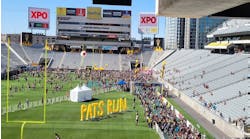Everyone has to get a vehicle towed at some point. This drives consumer memberships to AAA and other roadside assistance programs in case the need for a tow arises at the most inopportune time. However, in the trucking industry, a simple tow can cause more problems than many motor club members could imagine.
A Truckload Carrier Association member recently told me how shocked their fleet was by the cost of righting a trailer and towing the equipment a mere eight miles to the tow company’s yard—all for a bargain basement price of nearly $18,000. This is a far cry from an annual AAA membership of $99.
That TCA member isn’t alone. Trucking companies nationwide are being hit with massive tow charges that, in some cases, are more than the truck's value. Predatory towing has become the new normal. Our industry must find ways to keep this in check out of fear of being faced with a tow bill that creeps into six figures.
In these cases, excessive rate charges from predatory towers have become the most problematic issue. According to the American Transportation Research Institute, 82.7% of motor carriers reported excessive rate charges, with unwarranted service charges coming in second at 81.8%. It would be nice if these were the only problems associated with predatory towing.
See also: Mississippi passes predatory towing reform
Carriers across the country have also been dealing with the issue of holding cargo "hostage" during towing incidents. In what basically amounts to theft, in predatory towing situations, the cargo on a towed trailer simply isn’t released to the carrier required to deliver it, creating even more significant problems by further disrupting the supply chain. I have heard of instances where, even when the cargo is released, it is difficult at best to reclaim it.
This exorbitant fees issue has become so egregious that even Transportation Secretary Pete Buttigieg called out the junk fees charged by predatory towing companies when supporting the trucking industry regarding the Federal Trade Commission proposal banning excessive rates. While the FTC seeks to bring these issues in line, the true success of combating this problem is at the state level.
Maryland successfully fought this predatory towing by passing laws that established requirements and procedures for police-initiated tows and eliminating “per-pound” billing. More importantly, the Maryland Department of State Police must publicly list qualified towing companies and require those companies to provide rate sheets, prohibiting them from charging more than the published rates. Moreover, motor carriers have even earned the right to request a specific towing company, and state police must accommodate such requests if they can.
This legislative victory at the state level has started the process across the country. Florida, Missouri, and Colorado passed or are in the process of passing legislation that seeks to curb predatory towing. Certainly, transparency in rates, as cited by ATRI, will almost always be an issue as the state fights continue.
A new Mississippi law creates an advisory committee to set the maximum towing rates to fight predatory behaviors. States have shown some success in eliminating these practices, and I encourage each of you to participate in these efforts so that our industry can achieve even greater success.
There are certainly some very reputable towing companies that service our industry, a practice that is very much needed to keep the supply chain moving. As unfortunate as accidents are, the industry needs responsive and reputable towing companies to ensure the free flow of freight; however, the negative performance of some in the industry has led to new challenges at the state level.
In a perfect world, trucking and towing companies would work together to resolve this problem, but for now, the success of state legislation is paving the way.




